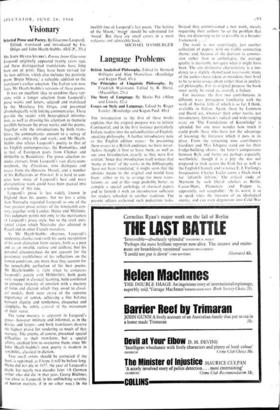Visionary
Selected Prose and Poetry. By Giacomo Leopardi. Edited, translated and introduced by Iris Origo and John Heath-Stubbs. (O.U.P., 35s.)
MR JOHN HEATH-STUBBS% Poems from Giacomo Leopardi originally appeared twenty years ago, and these distinguished translations have long been out of print. They have been revised for the new edition, which also includes the patriotic poem 'Bruto Minore,' a valuable addition to the translator's earlier selection. The Italian text now faces Mr Heath-Stubbs's versions of these poems.
It was an excellent idea to combine these ver- sions with a longer selection from Leopardi's prose works and letters, selectee and translated by the Marchesa Iris Origo, and presented chronologically with linking commentaries. These pro/1'de the reader with biographical informa- tion, as well as drawing his attention to thematic parallels between the prose works and the poems. Together with the introductions by both trans- lators, the commentaries amount to a survey of Leopardi's entire life and work; and Mr Heath- Stubbs also relates Leopardi's poetry to that of his English contemporaries, the Romantics, and to that of European poets from Chenier and Holderlin to Baudelaire. The prose selection in- cludes extracts from Leopardi's vast diary-cum-
notebook, the Zibaldone, nine dialogues and essays from the Operate Morali, and a number of his Reflections or Petnieri. It is hard to con-
ceive how more of Leopardi's best and most characteristic work could have been packed into a volume of this size.
Leopardi's prose is less widely known in England than his poems; but no less a critic than Nietzsche regarded Leopardi as one of the four greatest prose writers of the nineteenth cen- tury, together with Landor. Heine and Merimee.
This judgment points not only to the incisiveness of Leopardi's prose style, but to the stark exis- tential vision which Nietzsche also admired in Pascal and in other French moralists.
As Mr Heath-Stubbs observes, Leopardi's modernity also has to do with his acute recognition of his own alienation from society, both as a poet and as an invalid, recluse and celibate; but his personal circumstances do not account for the passionate truthfulness of his reflections on the human condition, any more than they account for the remarkable perfection of his best poems.
Mr Heath-Stubbs is right when he compares Leopardi's poetry with Holderlin's; both poets were steeped in classical learning, both combined an extreme intensity of emotion with a mastery of form and diction which they owed to classi- cal models. Both were aware of the supreme importance of syntax, achieving a fine balance between dignity and tenderness, eloquence and simplicity, by subtle control of the movement of their verse.
The same mastery is apparent in Leopardi's prose--however intimate and informal, as in the diaries and letters—and both translators deserve the highest praise for rendering so much of that mastery. The poems, of course, presented special difficulties to their translator, but a special affinity enabled him to overcome them, since Mr John Heath-Stubbs 's own poetry is modern in sensibility, classical in diction.
Two small errors should be corrected if the book is reprinted, as I hope it will be before long.
Heine did not die in 1837, the year of Leopardi's death, but nearly two decades later. (A German writer who did die in that year, Georg Bilchner, was close to Leopardi in his unflinching scrutiny of human motives, if in no other way.) In the twelfth line of Leopardi's last poem, 'The Setting of the Moon,' moan' should be substituted for 'mood.' But these are small errors in a most welcome and admirable book.
MICHAEL HAMBURGER














































 Previous page
Previous page